Ashtavinayaka or eight Ganeshas are located in Maharashtra state. The Ashtavinayaka yatra or pilgrimage covers the eight holy temples of Ganesh. All the eight Ashtavinayak Temples are Swayambhu(self-originated) and Jagrut.
History behind Moreshwar Temple
In the Gandaki Nagari of Mithila, a king named Chakrapani was ruling. He and his wife Queen Ugra were unhappy, as they did not have a child. The couple worshipped Deity Surya, and with His blessings the Queen became pregnant; but soon released the embryo into the sea as she could not bear the brilliance and the radiance of the embryo. From that embryo, a brilliant son was born. The sea in the disguise of a Brahmin approached King Chakrapani with the child and gave the child to the King. As the child was born in the sea the king named him Sindhu. Sindhu, after growing older and stronger became more powerful by worshipping the Sun God as advised by his Guru Shukracharya. Lord Surya, as a boon gave nectar to Sindhu and said that as long as the nectar remains near his navel he will not die. Sindhu thus received immortality and started attacking Gods like Indra, Vishnu etc. He defeated all of them and imprisioned them in his kingdom. The remaining Gods worshipped Deity Ganesh and requested him to rescue them from the demon king Sindhu. Ganesh pleased with their prayers, promised to take birth as Devi Parvati’s son and kill the demon.
Parvati recited the ekakshari ‘OM’ mantra and made a clay idol of Ganesha on Bhadrapada Shukla Chaturthi. The idol soon turned into a real child. When the child was ten years old, Shiva and Parvati along with their son decided to leave mount Meru and on their way to mountain Kailash, Ganesh defeated the demon Kamalasura with the help of Siddhi (Shakti personified) and Buddhi (Intelligence personified). After this incident Ganesh found the Gandaki Nagari of the demon king Sindhu and decided to attack him with the army of Shiva’s attendants. He thus attacked Sindhu and first killed the two sons of Sindhu.
Sindhu was advised to release the Gods and Goddesses in prison and leave the battlefield by his father. But he did not listen to it and continued the battle. Lord Ganesha removed the nectar from his navel with his Parashu and killed him. During this battle, Lord Ganesha was riding a peacock during the battle and therefore he got the name ‘Mayureshvar’, the one who rides a peacock. Mayureshvar decided to reside at Morgaon, for the sake of his devotees.
Morgaon
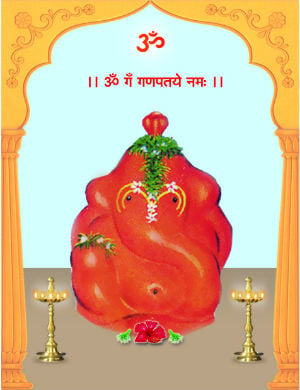
Shri Moreshwar
The Mayureshwar or Moreshwar temple is along the Karha river in the Morgaon village. A temple that looks like a tiny fort from a distance, is situated in the Baramati Taluka of Pune district in Maharashtra. This region is also known as the Bhuswananda. Shaped as a peacock, this region has in the past seen an abundance of peacocks and is therefore known as Morgaon ( Mor – peacock ).
The idol of Moreshwar is in the garbhagriha or the sanctum in which only the main priest can enter. The idol is facing east. The deity is three eyed, seated, and his trunk is turned towards the left. The eyes and the navel of the deity are studded with precious diamonds. On the head are seen the fangs of Nagaraj. The deity is flanked by brass idols of Siddhi and Buddhi who are considered the consorts of Ganesh. In front of the deity stand a mouse and a peacock.
Just opposite the main gate are a tortoise and a Nandi facing the deity in the sanctum. The presence of a Nandi in a Ganapati temple is rare as Nandi is the conveyance of Lord Shiva . When one enters the temple premises one first sees the mooshak ( Mouse – Ganesha’s means of conveyance) holding two laddos between his paws.
Yatra : Magha Shukla 4 and Bhadrapada Shukla 4. The God’s palkhi travels from Chinchwad during both the chaturthis.
Utsav : Vijayadashami Shukla 4 and Krishna 4, Somavati Amavasya.
Road : 68 km from Pune on the Pune-Bangalore highway.
Railway : Alight at Nira or Kedgaon station on the Pune-Bangalore highway. (Regular buses ply from the station.)

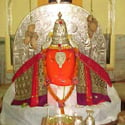 Shri Ballaleshwar, Pali
Shri Ballaleshwar, Pali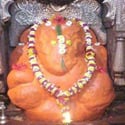 Shri Mahaganapati, Ranjangaon
Shri Mahaganapati, Ranjangaon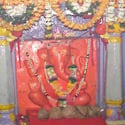 Shri Varad Vinayak, Mahad
Shri Varad Vinayak, Mahad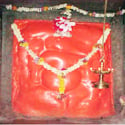 Shri Girijatmaj, Lenyadri
Shri Girijatmaj, Lenyadri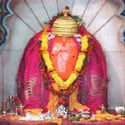 Shri Vigneshwar, Ozar
Shri Vigneshwar, Ozar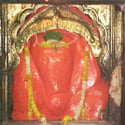 Shri Siddhivinayak, Siddhatek
Shri Siddhivinayak, Siddhatek